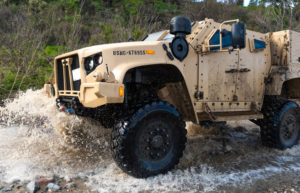COLUMBUS, Ohio – After winning the Army’s new Joint Light Tactical Vehicle (JLTV) production contract, AM General has said it’s planning to build the platform in “some very non-traditional ways.”
Jim Cannon, AM General’s president and CEO, declined to offer specifics at this time on the manufacturing approach, while telling Defense Daily the company is “well into execution” when it comes to moving toward JLTV production.

“We have a very robust manufacturing capability, so we had confidence in that. We approach building the JLTV, I think, in some very non-traditional ways as we were thinking about the process,” Cannon said during an interview at NDIA’s Tactical Wheeled Vehicle (TWV) conference here. “I’d rather not provide specific details at this point…At this stage, we’re keeping our cards a little bit close to the vest on that.”
AM General last month beat out current JLTV manufacturer Oshkosh Defense [OSK] for the potential 10-year, $8.7 billion re-compete production contract, which may cover delivery of up to 20,682 JLTVs and up to 9,883 JLTV Trailers (Defense Daily, Feb. 9).
“It’s hard to sometimes win when there’s an incumbent. But I looked at it like a no-lose mission. We were either going to compete to win and win it. And we did. And, of course, we’re very humbled and fortunate for this opportunity now. Or, we would compete to win and be beaten, but the Army would get a better vehicle,” Cannon told Defense Daily.
Oshkosh Defense, which won the original JLTV competition in 2015 and has delivered more than 19,000 vehicles and 3,500 JLTV trailers to date, has not confirmed yet whether it plans to protest the award decision.
In a statement following the contract announcement, Oshkosh Defense said it was “disappointed” to lose the competition and would be pursuing a debrief on the source selection decision (Defense Daily, Feb. 10).
The Army owns the JLTV’s data package, and the Program Executive Office Combat Support & Combat Service Support (PEO CS&CSS) said the competition “focused on a best value determination that includes retaining the capability of the JLTV today, while ensuring that it can be upgraded in the future with the latest technologies.”
AM General received an initial $230.9 million JLTV order from the Army under the new production deal, with deliveries expected to begin within 17 months.
“We’re leaning forward in the saddle. Even when we turned in the proposal, we were beginning to lean forward in the saddle. We wanted to do all the things that we could without significant sunk costs even before the program was awarded, like permitting, planning, design work, all the administrative things that can be done that can slow down actual project execution,” Cannon said.
JLTVs produced under the new contract will be the new A2 model, which Cannon noted will feature “dozens and dozens of engineering changes.”
“It will look the same, if you look at it from the outside. Now, the badge on the front may be different…but besides [that], if you were looking at it from a distance you probably couldn’t perceive a difference between a [JLTV] A1 or A2. But there are, again, dozens and dozens of engineering changes. As Oshkosh has made engineering changes over the years, going forward we will also, in partnership with the Army, continue to make the vehicle the best vehicle we possibly can for soldiers,” Cannon said.
Engineering changes from the current JLTV A1 to the new A2 model include an updated powertrain and alternator, increased fuel efficiency, improved corrosion protection, a simplified electrical architecture featuring a lithium-ion battery, a new base line integration kit to allow for more cargo storage space and design changes to reduce vehicle noise, according to AM General.
Cannon noted AM General also included anti-idle capability as a technology enhancement in its JLTV proposal, which the Army has cited as a key step toward reducing fuel consumption and moving toward potential vehicle electrification (Defense Daily, March 4 2022).
“We’re already well into the execution of that concept and having it proved out,” Cannon told Defense Daily.
Timothy Goddette, deputy assistant secretary of the Army for sustainment, told attendees at the NDIA TWV conference this week that hybrid-electrification for the service’s tactical wheeled vehicle fleet is likely “around the corner” depending on the results of ongoing research and prototyping efforts (Defense Daily, Feb. 28).
Cannon said AM General is not currently working on its own hybrid-electric version of the JLTV, while noting the technology area remains a focus to align with the Army’s priorities.
“We know that’s where our customer’s going. So we’ve got a tremendous amount of focus on that,” Cannon said. “But the long answer is, ultimately, yes. Because we know that there’s going to be interest in that from our customer. But right now, no.”